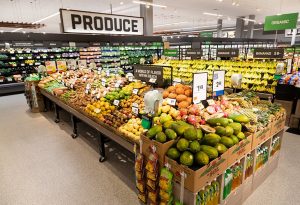Retailers re-envision, expand fresh food departments
ARLINGTON, Va. – A deep dive by the Food Industry Association (FMI) into the state of fresh foods at retail finds that the category’s momentum is sustainable and is pushing deeper into the digital channel.
The pandemic changed Americans’ grocery shopping and cooking habits, with consumers incorporating more fresh foods into their diets, says Leslie Sarasin, FMI’s president and chief executive officer, who notes that food retailers and suppliers are responding to the heightened consumer interest with enhanced offerings, both in-store and online.
 FMI unveiled its inaugural “The State of Fresh Foods” report August 17 during its FreshForward event in Denver, offering a sneak peek at the association’s soon-to-be-released “The Food Retailing Industry Speaks 2022” analysis. The report details investments in fresh food departments in stores and quantifies gains in fresh food purchases initiated online.
FMI unveiled its inaugural “The State of Fresh Foods” report August 17 during its FreshForward event in Denver, offering a sneak peek at the association’s soon-to-be-released “The Food Retailing Industry Speaks 2022” analysis. The report details investments in fresh food departments in stores and quantifies gains in fresh food purchases initiated online.
“As we look at fresh foods departments, it’s important to see where businesses are investing and how the food industry is responding to changing consumer trends,” according to Rick Stein, vice president of fresh foods for FMI. “Two important areas stand out. First, the fact that 40% of online sales are being generated by fresh foods departments suggests a major change from previous trends. Second, it is significant to note the emphasis that retailers are putting on foodservice and prepared foods departments.”
At 40%, the proportion of online food sales attributed to fresh fruits and vegetables approaches the 41% of dry grocery items comprising the typical online food cart, and dwarfs the 11% contribution from frozen food, FMI said.
The report finds that food retailers are re-envisioning fresh foods departments with enhanced space allocation and increased staff.
Eighty-two percent are planning to grow the space allocation for fresh-prepared grab-and-go options, while others are increasing space for fresh made-to-order stations (35%) or fresh-prepared self-service (29%).
Retailers are also increasing staff for foodservice (44% of retailers planning), trained or certified chefs (22%), in-store dining (20%), and scratch bakers or pastry chefs (18%).
Retailers surveyed by FMI are getting creative with their service differentiation strategies by experimenting with new consumer touchpoints, like in-store dining (51%), a coffee bar (39%), online ordering and pickup/delivery of foodservice offerings (33%), catering services (30%), a juice bar (20%) and a full-service restaurant (13%).
However, the success of these programs has been mixed. Retailers report a success rate of as high as 60% for juice bars to as low as 13% for online ordering and pickup/delivery of foodservice offerings, revealing an opportunity for retailers to explore other specialty options.




You must be logged in to post a comment Login